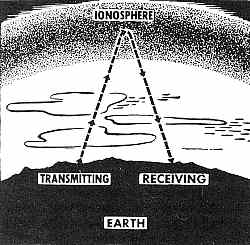|
The
Army was also conducting experiments in the same field. In the late
twenties Colonel William Blair of the Signal Corps urged the use of
radio to replace the Army's sound locator. The Army and Navy pooled
their information and since that time have worked in close cooperation.
Radio waves were first used to find the direction of the object, but in 1925 Drs. Breit and Tuve of the Carnegie Institution of Washington measured the distance to the radio sky reflecting ceiling. They sent out a series of short radio pulses and measured the time it took for them to go out and be reflected back to Earth. Knowing the speed it is possible to determine distance as well as direction.  This determination of a distance involves the accurate measurement of time in millionths of a second. Radio and light waves travel about 1,000 feet per millionth of a second. For instance if the object is ten miles away, approximately 50,000 feet, it takes 100 millionths of a second for the radio signal to go out and back. This time is measured by the use of a cathode ray tube, a standard piece of apparatus in most laboratories. |








